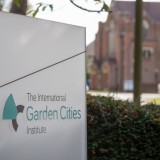Hello! I want to share some of the things we have been doing on the research and education front at the International Garden Cities institute over December 2018 and January 2019. I hope you are bearing up to the wintery conditions – as I write this I have been enjoying today’s promise of Spring with warmer temperatures and blue skies.
As I reported on in my last blog (Oct-Nov 2018) I was invited by the Town and Country Planning Association (TCPA) to work with them on developing an ‘Edible Cities Guide’ for people working on developing new urban places. The Guide is offering advice on how food – urban agriculture and more – can relate successfully to Ebenezer's Howard's original principles and can be a central part of delivering new garden cities today. It will work alongside a number of practical guides the TCPA has already produced. As part of that process I was asked to provide a presentation to the TCPA New Communities seminar on Edible Cities which was held in January 2019 in London. I was able to offer an overview about urban food planning and design, explore the origins and themes in Howard’s food related proposals and principles, and consider how these might be revived within contemporary city design, planning, housing development and governance practice – right along the food chain from food production to waste.
There were some great speakers at the Edible Cities event including the inspiring Pam Warhurst from Incredible Edible Todmorden who showed how ‘bottom up’ action taken by communities themselves in food growing – without first ‘asking permission’ – has led to a much broader movement that has spread from its origins in Todmorden to towns and cities around the UK and beyond. Pam made the highly pertinent point that getting bigger as a movement didn’t need to mean food related interventions in places had to be done only at a large, coarse scale. It could also mean supporting a lot of more small, human-scaled initiatives in many different places that related to their unique qualities. One of Pam’s place-based points was that the Northern Powerhouse should be reframed as the ‘Northern Greenhouse’ with a sustainable, socially inclusive approach including about food given much more prominence. As Pam said ‘If you eat, you’re in’.
Katy Lock, the TCPA’s Projects and Policy Manager, also offered some extremely useful insights on how food relates to garden city principles in a practical way. Katy explored what the TCPA means when it refers to ‘Edible Garden Cities’ and how that can be implemented in the context of the National Planning Policy Framework and local plans. Katy looked at ‘making it happen’ through management and stewardship, finance, and a long term legacy driven approach. Katy’s TCPA colleague, Julia Thrift, gave an excellent review of where we are up to on food policy for new places and how we might improve that in the context of urgent climate change and other imperatives including protecting soil and water quality and availability. Also dwelling very usefully on planning policy was Sustain’s Gillian Morgan who focused in on how planning policies and strategies could offer practical support to a more food-centred approach to new places. Setting out a spatial vision for a sustainable food city, Gillian noted this was something planning needed to do much more on.
Also in January, I was very pleased to take part as a jury member in the Letchworth Garden City Heritage Foundation’s Design Competition for the development of a new part of town on the northern edge of Letchworth. Re-imagining the Garden City is being run in conjunction with the Royal British Institute of Architects (RIBA). The Design Competition has now reached the shortlisted entries stage and further work to refine the four shortlisted entries will now take place before a final winner is chosen. As David Ames from the LGCHF has noted in the Architects’ Journal, ‘We are very impressed with the quality and number of entries we have received. Narrowing the entries down to just four has been extremely challenging, but we are very pleased with the shortlist and look forward to seeing how these exciting ideas develop and the views of our local community.’
On the research front, the Edible Cities Network (‘EdiCitNet’) research project which started in 2018 (and I reported on in my blog from August-September 2018) is developing well. As I explained then the Letchworth Garden City Heritage Foundation secured funds within a large international EU funded research project consortium as a ‘follower city’. This role allows it to explore possible ways to create ‘edible city solutions’ that also reflect Letchworth’s original garden city principles in relation to food. These may well offer lessons for other places too. We are in the process of setting up a ‘City Team’ in Letchworth which will include a number of food related stakeholders and will help run the work and engagement with Letchworth residents to implement, disseminate and learn from the project.
Another excellent piece of news to impart is that our Herts Science Partnership Scholar at the University of Hertfordshire, Ms Amélie André, has completed the knowledge transfer part of doctoral programme. Amelie has been working closely with Letchworth Garden City Heritage Foundation which is the ‘industry partner’ for the applied research to explore food economy issues in Letchworth. Amélie has produced some excellent food mapping and other ‘outputs’ from her first year’s work in Letchworth. Amélie will be reporting on her work and findings in a series of think pieces on the International Garden Cities Institute website, so look out for those over the coming months.
Also over December and January I have had the chance to do some teaching with undergraduate Geography students at the University of Hertfordshire to explore the whole area of ‘Planning Ideal Communities’. This was a great opportunity to acquaint the students with the incredible patrimony of garden city and new town ideas and places in Hertfordshire and look at how garden city principles and proposals are playing out today, from a geographical perspective. I was also very pleased to hear from an undergraduate at another university who is researching garden cities – it’s good to know this area continues to attract student interest and I hope my comments were useful!
Finally, a very positive piece of ‘organisational’ news is that Letchworth Garden City Heritage Foundation and the University of Hertfordshire are renewing our Memorandum of Agreement through which we work as partners on a range of garden city related education and research focused activities. One personal outcome is that this renewed MoA provides the basis for me to continue as Academic Director of the International Garden Cities Institute, about which I am extremely pleased. I am very much looking forward to continuing to work at the IGCI and helping in a modest way to expand understanding and knowledge about garden cities.
Well, that’s about it from me until my next blog in the spring. There is plenty going on and I will look forward to reporting more news to you then.
Dr Susan Parham
Academic Director, International Garden Cities Institute
February 2019

